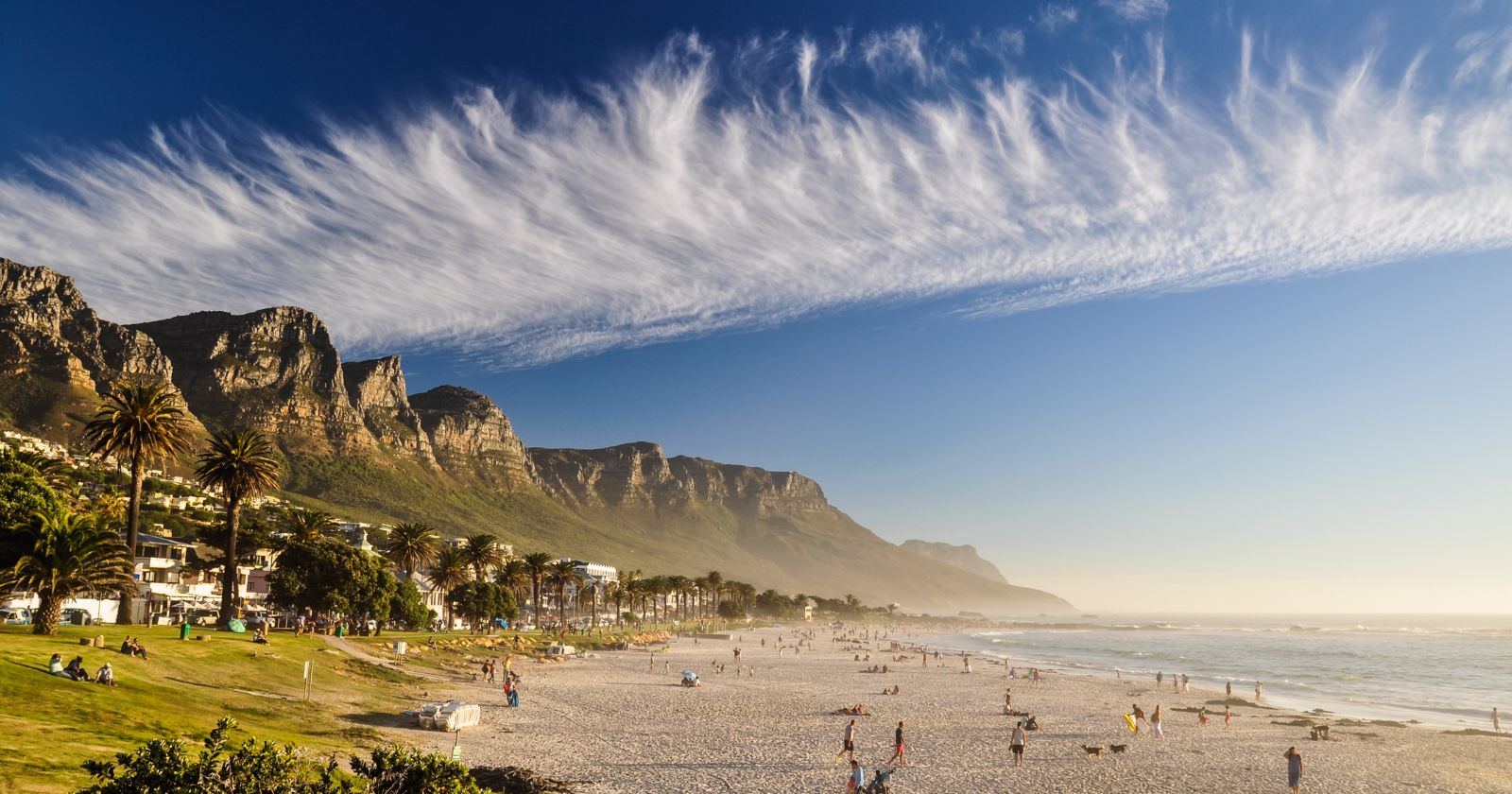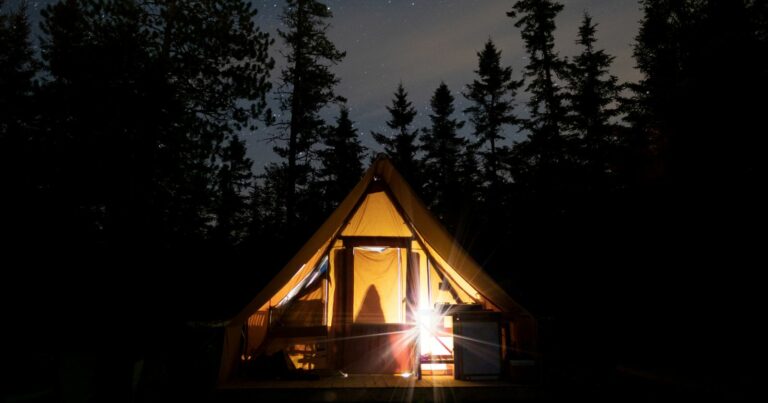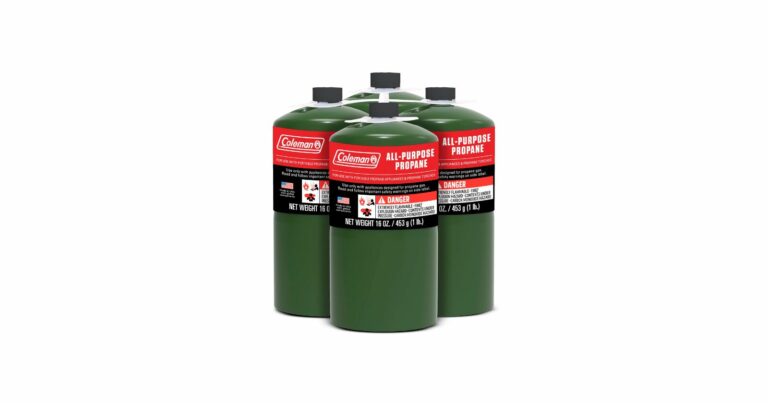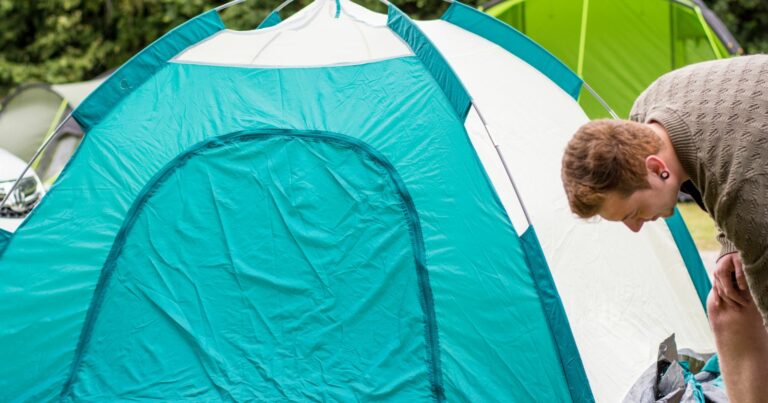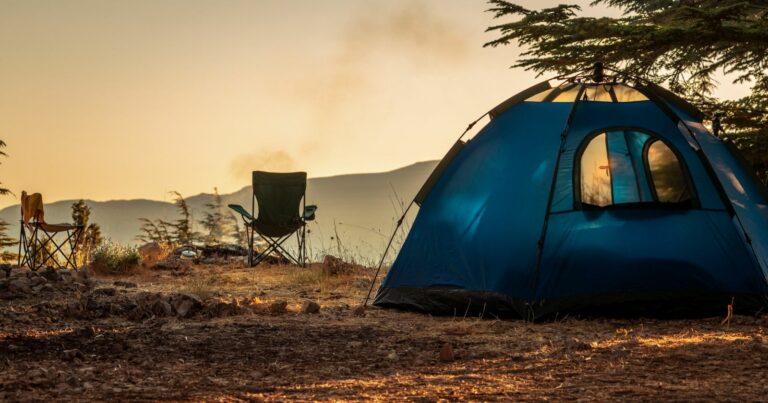What is the Number One Rule of Camping?
The crackling campfire beckons you closer as the sun sets behind the pines. You breathe in the crisp, pine-scented air as you reminisce about your day spent fishing at the lake. As the daylight fades to dusk, you feel a sense of calm wash over you. This is why you love camping – that feeling of being at one with nature.
But there’s one crucial thing you must remember as you enjoy these tranquil surroundings. It’s the number one rule of any responsible camper: leave no trace.
When you leave your campsite, it should look exactly as it did before you arrived, if not better. Make sure you pick up any trash, leftover food scraps, or other litter. Don’t just leave it behind or try to hide it in the bushes. Pack it all out with you. The animals will thank you for not leaving tempting (and harmful) snacks lying around.
While gathering firewood, stick to small twigs and branches that have already fallen. Don’t cut down trees or strip off bark. The plants need to stay healthy so the forest remains vibrant.
Follow any campground rules about fire safety and noise levels so everyone can appreciate the peace and quiet. And be mindful not to trek through other campsites – give your fellow nature lovers a respectable amount of space.
When we leave no trace, we help preserve the beauty so more people can enjoy these public lands. Treat the forest and its creatures with the same respect you’d want others to show your home. Do your part to leave every campsite better than you found it.
Now that you know the most important camping rule, you can relax by the fire knowing you’re helping protect the wilderness for future generations. The rest of this article will provide tips to make low-impact camping easy and instinctual…
Leave No Trace is the Cardinal Rule of Camping
The number one rule of camping is to leave your campsite in the same (or better) condition than how you found it. This concept is known as “Leave No Trace” camping.
Leave No Trace means packing out all your trash and leftover food. Take everything with you when you leave – don’t just hide it in the bushes. Animals will go rooting through your leftovers and can become ill from eating the wrong foods.
It also means not cutting down trees or stripping bark to use as firewood. Stick to collecting small, dead branches that have already fallen. This allows the living trees and plants to remain healthy so the forest stays vibrant.
And Leave No Trace means walking around – not through – other people’s campsites. Give your fellow campers space and don’t trample through their sites.
When we all Leave No Trace, the wilderness stays pristine and protected for future generations to enjoy.
Why is Leave No Trace So Important?
Leave No Trace ethics teach us to respect the environment and other campers. Without these guidelines, public lands can quickly become overrun with pollution and damage.
Leave No Trace helps:
- Preserve natural resources – By not cutting down trees or bushes, we allow plants to keep growing. And by not leaving food or trash behind, we prevent animals from being attracted to campsites and becoming conditioned to human food sources.
- Respect wildlife – Trash and food can attract bears, raccoons, and other potentially dangerous animals. Proper food storage and complete pack out prevent wildlife encounters.
- Let others enjoy nature – No one wants to hike into a campsite littered with someone else’s garbage. Picking up after yourself keeps areas beautiful for the next visitors.
- Protect access to public lands – If enough damage occurs, land managers may be forced to close the area to campers. But if we all Leave No Trace, these lands can remain open for responsible use.
How to Practice Leave No Trace Camping
Practicing Leave No Trace camping is easy once you get into the habit. Just remember these guidelines:
Plan Ahead and Prepare
- Research your destination and campground rules before heading out. Know ahead of time what is required and recommended.
- Plan your meals carefully to minimize food waste and leftovers. Repackage food into reusable containers.
- Make sure you have enough bags and containers to carry out all trash and waste. Bring an extra garbage bag or two.
Follow Campground Regulations
- Observe campground policies on fires, noise curfews, alcohol, pets, and number of occupants per site. This helps maintain order.
- Don’t construct new fire rings, trenches, or furniture. Use only existing fire rings and structures when provided.
- Pay all fees promptly. The money goes towards upkeep of the campground.
Leave What You Find
- Allow plants, rocks, artifacts and other natural objects to remain undisturbed. Leave them for others to discover and enjoy.
- Avoid introducing non-native species by not transporting firewood or plants to new areas.
Be Careful with Fire
- Where fires are permitted, use established rings, fire pans, or mound fires. Don’t construct new rings.
- Keep fires small to minimize impact and use only sticks from the ground that can be broken by hand.
- Burn all wood and coals to ash, put out fires completely, then scatter cool ashes.
Respect Wildlife
- Do not feed animals or leave food scraps out. Store food securely.
- Observe wildlife from a distance and give animals space. Never chase or follow them.
- Keep pets under control and prevent them from approaching or chasing wildlife.
Be Kind to Other Visitors
- Avoid loud noises, especially during quiet hours. Keep your camp neat and clean.
- If camping in a group, spread out tents and give other campers privacy.
- Let nature’s sounds prevail by avoiding loud music or electronics. Use headphones if you must.
- Walk around – not through – other campsites. Follow marked trails when available.
Dispose of Waste Properly
- Pack out ALL trash – even food scraps, hygiene products, and cigarette butts. Leave no trace of your stay.
- Use restroom facilities when available. For waste when none exist, dig 6-8” holes at least 200 feet from water and camps. Cover and disguise holes when finished.
- Wash yourself and dishes at least 200 feet from streams or lakes. Use biodegradable soap and scatter strained dishwater.
Never Litter
- Put cigarette butts, feminine products, diapers, dental floss, and other waste into trash bags – do NOT bury or burn them.
- If you dropped it, pick it up – even if it’s not yours. Help keep the area pristine.
- Avoid balloons, confetti, and sky lanterns. If they escape, they become dangerous litter.
Learn and Teach Leave No Trace
Once you know the principles, teach Leave No Trace ethics to your kids and camping buddies. Lead by example.
- Before your trip, have a quick Leave No Trace review to get everyone on the same page.
- Gently call out friends if they start doing something damaging like stripping bark or chasing wildlife. Politely ask them to stop.
- Praise kids and adults when you see them packing out trash, respecting campsites, or following any other Leave No Trace guidelines. Positive reinforcement develops lifelong habits.
Enjoy Your Camping Trip Responsibly
Armed with Leave No Trace awareness, you can head out to enjoy public lands knowing you’re doing your part to protect them. Reference these tips when packing for your next camping trip and put them into practice once you’re out in nature.
Soon, treading lightly and packing out everything that you brought in will become second nature. By modeling and teaching low-impact camping ethics, we collectively preserve our shared lands so that future generations get to experience the same pristine wilderness we enjoy today.
Remember, we all play a role in protecting these special places. So please – Leave No Trace on your next camping trip. The animals, plants, and fellow travelers that call the forest home will thank you!
Now get out there and make some unforgettable memories in the great outdoors. Just be sure to pack out those memories when you leave – along with everything else you brought!

